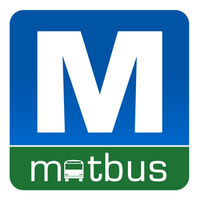
Fargo is the most populous city in the U.S. state of North Dakota and the county seat of Cass County. The population was 125,990 at the 2020 census, which was estimated to have grown to 133,188 in 2023, making it the 218th-most populous city in the United States. Fargo, along with its twin city of Moorhead, Minnesota, form the core of the Fargo–Moorhead metropolitan statistical area, which had a population of 248,591 in 2020.

North Dakota State University is a public land-grant research university in Fargo, North Dakota. It was founded as North Dakota Agricultural College in 1890 as the state's land-grant university. As of 2021, NDSU offers 94 undergraduate majors, 146 undergraduate degree programs, 5 undergraduate certificate programs, 84 undergraduate minors, 87 master's degree programs, 51 doctoral degree programs of study, and 210 graduate certificate programs. It is classified among "R1-Doctoral Universities – Very High Research Activity".
The Central New York Regional Transportation Authority, commonly referred to as Centro, is a New York State public benefit corporation and the operator of mass transit in Onondaga, Oswego, Cayuga, and Oneida counties in New York state. The CNYRTA was formed on August 1, 1970, along with similar agencies in Rochester, Albany, and Buffalo.
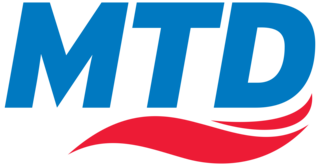
The Champaign–Urbana Mass Transit District is a mass transit system that operates in the Champaign–Urbana metropolitan area in central-eastern Illinois. MTD is headquartered in Urbana and operates its primary hub at the intermodal Illinois Terminal in downtown Champaign. In 2023, the system had a ridership of 8,947,600, or about 26,400 per weekday as of the second quarter of 2024.

Fargodome is an indoor athletic stadium in the north central United States, located on the campus of North Dakota State University (NDSU) in Fargo, North Dakota. Opened 32 years ago in late 1992, the facility is owned by the City of Fargo and built on university land. Not an actual dome, its seating capacity is 18,700 for football and over 25,000 for full arena concerts. Its approximate elevation at street level is 900 feet (275 m) above sea level.
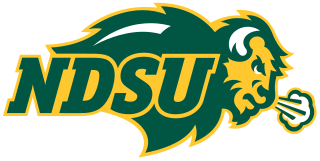
The North Dakota State Bison are the athletic teams of North Dakota State University (NDSU), which is located in the city of Fargo, North Dakota. The teams are often called the "Thundering Herd". The current logo is a bison.
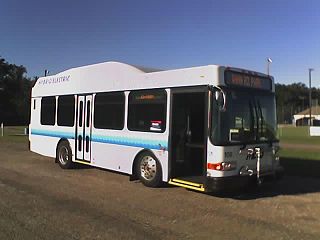
Metropolitan Evansville Transit System (METS) is a public transit system consisting primarily of bus service in the city of Evansville, Indiana.

Maple Grove Transit is a suburban public transit provider in the Minneapolis – Saint Paul metropolitan area of Minnesota serving the city of Maple Grove. The service currently operates 5 express routes from Maple Grove to Downtown Minneapolis in the morning and return from Minneapolis to Maple Grove in the afternoon. An additional express route runs between the municipality and the University of Minnesota. One feeder route with timed transfers also connects with the Downtown express routes. Local flex service is provided by the agency, as well.

Cities Area Transit (CAT) is the public transportation system in the neighboring cities of Grand Forks, North Dakota, and East Grand Forks, Minnesota. The scheduled transit bus routes are operated by the city of Grand Forks and service is provided to East Grand Forks through a cost-sharing agreement. Paratransit for those who are unable to use the regular bus under the ADA, and a service for seniors, are provided under contract by Grand Forks Taxi.
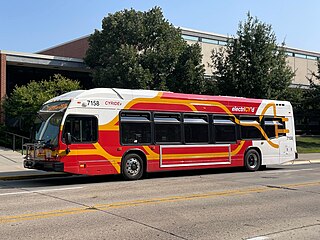
CyRide is a partnership between Iowa State University, the ISU Student Government, and Ames, Iowa. CyRide provides public transportation to the community throughout the city of Ames. The word CyRide is a portmanteau of two words: Cy and the word ride. In January 2012, CyRide was recognized "as the nation’s small urban transit system with the highest number of rides per capita" at 106 rides per capita. In 2019, CyRide ranked third in the nation with 110.2 rides per capita, behind the transit systems of New York and San Francisco.
Go COMO, formerly Columbia Transit, is a city-owned public bus system that serves the city of Columbia, Missouri. The system operates Monday through Saturday, except on major holidays. Services include fixed-route services, bookings for para-transit shuttles for the disabled, a system of commuter shuttles for students and employees of the University of Missouri, and hotel shuttles during MU football games. In fiscal year 2009, 2,007,263 rides were logged along the system's six fixed routes and University of Missouri Shuttle routes, while the latest available records show 27,000 rides logged aboard the para-transit service.

The Sioux Area Metro (SAM) is the local governmental transit agency in Sioux Falls, South Dakota, and the state's largest public transportation operator. They provide multiple scheduled fixed routes and paratransit services. In December 2023, city council members voted unanimously to select Via as its technology and operations partner. In 2023, the system had a ridership of 559,400, or about 1,800 per weekday as of the second quarter of 2024.
Metropolitan Tulsa Transit Authority, usually known as MTTA or Tulsa Transit, is the public transit system operating buses and paratransit for Tulsa, Oklahoma. In existence since 1968, the system consists of 21 regular routes and 4 night routes, with two major transit hubs: Memorial Midtown Station at 7952 E. 33rd St. in Midtown Tulsa, and the Denver Avenue Station at 319 S. Denver across from the BOK Center in Downtown.
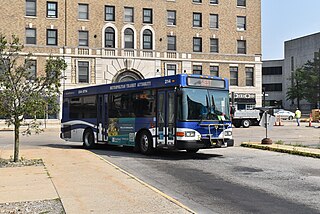
The Metropolitan Transit Authority of Black Hawk County, marketed as MET Transit, is the primary provider of mass transportation in the cities of Waterloo and Cedar Falls, Iowa. The agency was founded in 1972, after the private National City Lines, which had operated public transit under contract from the city, pulled out of providing fixed routes, which led to the city directly taking over this service.
Rapid City Rapid Ride is the provider of mass transportation in the City of Rapid City, Pennington County, South Dakota providing fixed route bus service since 1992. Five scheduled bus routes operate Monday through Saturday at 30 minutes intervals. Dial-A-Ride provides ADA paratransit service for qualified customers. City View Trolley is a replica trolley service.
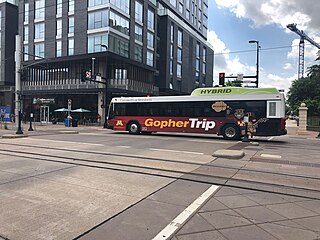
The University of Minnesota's Campus Shuttle is a zero-fare bus service operating on the University's Minneapolis and St. Paul campuses. In 2009, the system carried more than 3.9 million riders, making it the second-busiest transit system in Minnesota after the Twin Cities's primary provider Metro Transit. It outpaces all of the suburban transit providers in the Twin Cities, as well as providers in other metropolitan areas in the state. Duluth Transit Authority serving Duluth, Minnesota, and Superior, Wisconsin, is the state's third-busiest provider, while the Minnesota Valley Transit Authority ranks fourth. The shuttles are operated under contract by First Transit through the University's Parking and Transportation Services (PTS) department.

Bis-Man Transit is the public transportation system in the neighboring cities of Bismarck, North Dakota and Mandan, North Dakota. The scheduled transit bus routes are branded as CAT and operated by the non-profit Bis-Man Transit Board. The Bismarck-Mandan fixed route system is a flag down system, which means a bus can be stopped anywhere along the route, as long as it is not in a no stop zone. Paratransit is provided for those who are unable to use the regular bus under the ADA.
Go West Transit is the primary provider of mass transportation in McDonough County, Illinois with routes serving Western Illinois University and the Macomb area. The system runs 17 routes with over 100 stops and is the only fare-free transit system in Illinois. As of 2019, the system provided 841,943 rides over 45,934 annual vehicle revenue hours with 18 buses and 10 paratransit vehicles.
Galesburg Transit is the primary provider of mass transportation in Knox County, Illinois with routes serving the Galesburg area. As of 2019, the system provided 160,712 rides over 23,487 annual vehicle revenue hours with 4 buses and 8 demand response vehicles.
